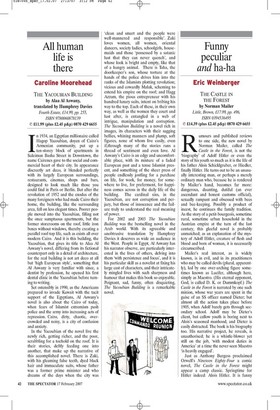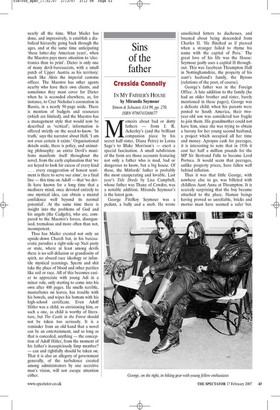Funny peculiar and ha-ha
Eric Weinberger THE CASTLE IN THE FOREST by Norman Mailer Little, Brown, f17.99, pp. 496, ISBN 0394536495 £1439 (plus £2.45 p&p) 0870 429 6655 Rumours and published reviews to one side, the new novel by Norman Mailer, called The Castle in the Forest, is not the 'biography' of Adolf Hitler or even the story of his youth so much as it is the life of his father Alois Schicklgruber, or Hiedler, finally Hitler. He turns out to be an unusually interesting man, or perhaps a merely ordinary man who, because he is rendered by Mailer's hand, becomes far more: dangerous, daunting, dutiful (an ever ascendant and honest customs official), sexually rampant and obsessed with bees and bee-keeping. Possibly a product of incest, he continues the family tradition. As the story of a petit-bourgeois, sometime rural, sometime urban household in the Austrian empire at the turn of the last century, this gleeful novel is probably unmatched; as an explanation of the mystery of Adolf Hitler, creature of flesh and blood and born of woman, it is necessarily circumscribed.
Mailer's real interest, as is widely known, is in evil, and in its practitioners who may be called devils (plural, apparently), led by one over-arching figure sometimes known as Lucifer, although here, simply as Maestro. (His eternal opponent, God, is called D. K. or Dummkopf.) The Castle in the Forest is narrated by one such minion, whose war years are spent in the guise of an SS officer named Dieter; but almost all the action takes place before 1905, when Adolf barely gets through secondary school. Adolf may be Dieter's client, but callow youth is boring next to Alois's seasoned manhood, and Dieter is easily distracted. The book is his biography too. His narrative project, he reveals, is unauthorised; he is a whistle-blower yet still on the job, 'with modest duties in America' at a time the never-seen Maestro 'is heavily engaged'.
Just as Anthony Burgess proclaimed Orwell's Nineteen Eighty-Four a comic novel, The Castle in the Forest might appear a camp classic. Springtime for Hitler indeed: Alois Hitler. It is funny nearly all the time. What Mailer has done, and impressively, is establish a diabolical hierarchy going back through the ages, and at the same time anticipating 'these latter-day American years', when the Maestro pays more attention to 'electronics than to print'. Dieter is only one of many devil-bureaucrats, with a small patch of Upper Austria as his territory: much like Alois the imperial customs officer. The Maestro has other agents nearby who have their own clients, and sometimes they must cover for Dieter when he is seconded elsewhere, as, for instance, to Czar Nicholas's coronation in Russia, in a nearly 50-page aside. There is mention of budgets and resources (which are limited), and the Maestro has a management style that would now be described as 'vertical'; information is offered strictly on the need-to-know. 'In truth,' says the narrator about Hell, 'I am not even certain it exists.' Organisational details aside, there is policy, and animating philosophy: an entire Devil's manifesto manifests itself throughout the novel, from the early explanation that 'we are keyed to look for excess of every kind . . . every exaggeration of honest sentiment is there to serve our aims', to a final line — this time on Adolf — that 'we devils have known for a long time that a mediocre mind, once devoted entirely to one mystical idea, can obtain a mental confidence well beyond its normal potential'. At the same time there is insight into the problems of God and his angels (the Cudgels), who are, compared to the Maestro's forces, disorganised, tremulous and more often than not, incompetent.
Thus has Mailer created not only an upside-down Church but, in his bureaucratic parodies a right-side-up Nazi party or state, where at least among devils there is no self-delusion or grandiosity of spirit, no absurd race ideology or infantile mystical yearnings. Sperm and shit take the place of blood and other purities like soil or race. All of this becomes easier to appreciate with young Adi in a minor role, only starting to come into his own after 400 pages. He smells terrible, masturbates on leaves, has trouble with his bowels, and wipes his bottom with his high-school certificate. Even Adolf Hitler was a child, so envisioning him, or such a one, as child is worthy of literature, but The Castle in the Forest should not be taken too seriously. It is a reminder from an old hand that a novel can be an entertainment, and so long as that is conceded, anything — the conception of Adolf Hitler, from the moment of his father's inauspiciously limp member? — can and rightfully should be taken on. That it is also an allegory of government generally, of the turbulence created among administrators by one secretive man's vision, will not escape attention either.


























































 Previous page
Previous page